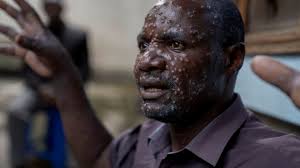ADDIS ABABA, Ethiopia – Mpox, the highly infectious disease formerly known as monkeypox, has been officially declared a public health emergency across Africa by the continent’s leading health authority, the Africa Centres for Disease Control and Prevention (Africa CDC). Health experts have expressed growing concern over the rapid spread of a new, more virulent strain of the virus.

Since the start of the year, more than 13,700 cases and 450 deaths have been recorded in the Democratic Republic of Congo alone. The virus, which causes painful lesions across the body, has now spread to several other African nations, including Burundi, the Central African Republic (CAR), Kenya, and Rwanda.
The declaration of a public health emergency is aimed at coordinating government responses across the continent and facilitating the swift movement of medical supplies and aid to the hardest-hit regions.
Africa CDC head Jean Kaseya emphasized the urgency of the situation, warning that the outbreak could spiral out of control if immediate action is not taken. “This declaration is not merely a formality. It is a clarion call to action. It is a recognition that we can no longer afford to be reactive. We must be proactive and aggressive in our efforts to contain and eliminate this threat,” Kaseya stated.
The Africa CDC will be closely monitoring the outbreak to assess the ongoing risk of the virus spreading further. Health officials outside of Africa have also been alerted, as the situation poses a potential global health threat.
On July 29, the European Centre for Disease Prevention and Control assessed the risk of Mpox spreading in Europe as “very low,” but cautioned against complacency.
Mpox primarily spreads from animals to humans and can also be transmitted through close contact with an infected individual. Transmission methods include skin-to-skin contact, respiratory droplets, and touching contaminated objects.
Symptoms of Mpox include fever, muscle aches, and the characteristic lesions that can appear across the body. While most cases have been reported in Africa, milder strains of the virus have been detected in Europe, Australia, the U.S., and other regions.
Health officials are particularly concerned about the emergence of this new strain, which appears to be more severe than the previously known versions of the virus. The situation remains fluid, with health authorities around the world on high alert to prevent further spread.
bbc.com



